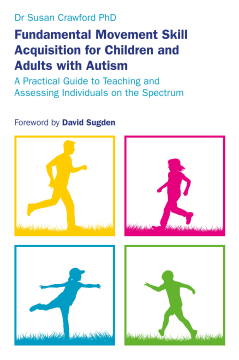
BOOK
Fundamental Movement Skill Acquisition for Children and Adults with Autism
(2018)
Additional Information
Book Details
Abstract
This innovative manual sets out advice on fundamental movement skill acquisition (FMS) and its benefits for improving physical, verbal and social skills for people with Autistic Spectrum Disorder (ASD). Improving FMS can help prevent long term health issues, and increase opportunities for social engagement and independence.
The book explores the basic skills of movement (running, catching, throwing, and balance) and how to observe, teach and assess FMS in children and adults with ASD. There are sections on how to develop and implement a programme for individuals to guide their personal development, and information on planning and tools for assessment are included. A much needed guide on how to combat impairment of FMS, the book also highlights the numerous benefits of such an approach in relation to behaviour, lifestyle, health and education.
Susan Crawford is a Lecturer at University College Cork, Ireland and Fulbright Scholar at the University of San Francisco. She has contributed to books and presented internationally on FMS and Autism.
Table of Contents
| Section Title | Page | Action | Price |
|---|---|---|---|
| Fundamental Movement Skill Acquisition for Children and Adults with Autism | 5 | ||
| Contents | 9 | ||
| Foreword | 11 | ||
| Acknowledgements | 15 | ||
| Introduction | 17 | ||
| Outline of the book | 18 | ||
| Chapter 1 - Introduction to Autism Spectrum Disorder | 21 | ||
| Diagnosis of ASD | 21 | ||
| Exploring issues in the world of ASD | 25 | ||
| Theories associated with ASD | 29 | ||
| Prevalence of ASD | 30 | ||
| Causes of ASD | 31 | ||
| Conditions associated with ASD | 32 | ||
| Teaching and learning interventions for individuals with ASD | 33 | ||
| Summary | 39 | ||
| Chapter 2 -Introduction to Fundamental Movement Skills | 41 | ||
| Understanding concepts in the world of FMS | 41 | ||
| Why is the development of FMS so important? | 44 | ||
| How are FMS developed? | 47 | ||
| Observation of FMS | 49 | ||
| Programme planning of FMS | 50 | ||
| Delivering an FMS programme | 52 | ||
| Use of demonstration to facilitate the learning of FMS | 53 | ||
| Use of feedback to facilitate the learning of FMS | 56 | ||
| Understanding closed and open motor skills | 58 | ||
| Understanding domains of learning | 61 | ||
| Assessment of FMS development | 64 | ||
| Mature FMS | 65 | ||
| Summary | 79 | ||
| Chapter 3 - Autism and Fundamental Movement Skill Research | 81 | ||
| Motor impairment and ASD | 81 | ||
| Confirmation of motor impairment for individuals with ASD | 82 | ||
| Motor skill interventions and ASD | 84 | ||
| Comparative study of physical activity levels among children with and without ASD | 90 | ||
| Summary | 92 | ||
| Chapter 4 - Tools for Assessment of Fundamental Movement Skills of Individuals with ASD | 93 | ||
| Explanation and justification of assessment tools available | 94 | ||
| Assessment of movement ability of individuals with ASD | 94 | ||
| Summary | 98 | ||
| Chapter 5 - Promoting and Maintaining Participation in FMS Programmes for Individuals with ASD | 99 | ||
| Assessment for FMS selection for individuals with autism spectrum disorder (ASD) | 99 | ||
| Intervention and programme planning for individuals with ASD | 102 | ||
| The ASD/FMS support kit | 107 | ||
| Maximising FMS acquisition | 108 | ||
| Summary | 122 | ||
| Chapter 6 - www.getautismactive.com | 123 | ||
| Summary | 128 | ||
| Conclusions and Future Directions Identified | 129 | ||
| References | 131 | ||
| About the Author | 141 | ||
| Index | 143 | ||
| Blank Page |
